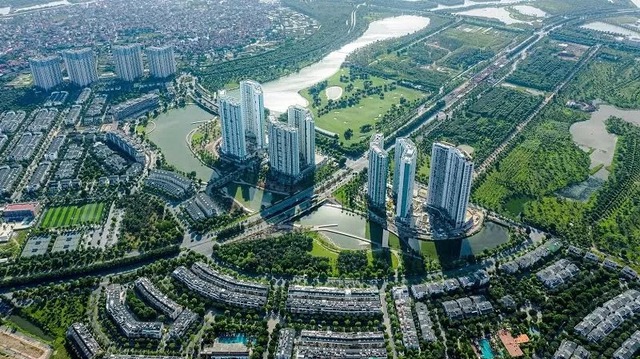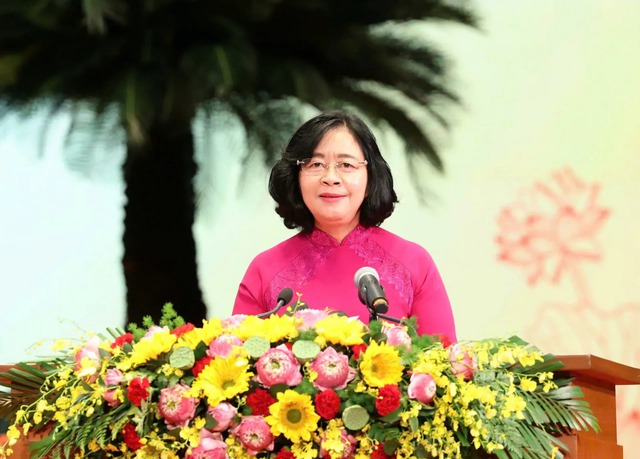Ha Noi charts journey to become a globally connected city by 2045
VGP - The 18th Party Congress of the Ha Noi Party Committee outlined an ambitious vision for the capital’s future, focusing on innovation, connectivity, and people-centered development to transform Ha Noi into a modern, livable, and globally integrated city.

Building on a decade of steady growth, improved living standards, and major infrastructure advances, Ha Noi has set its sights on becoming a "globally connected city" by 2045. This vision is among the key priorities in the draft political resolution for the 2025–2030 term, unveiled at the Congress on October 18 to define the capital's strategic direction for the new period.
According to the political report presented at the event, Ha Noi met or exceeded most of the targets set by the 17th Party Congress, despite the severe challenges posed by the COVID-19 pandemic and global economic turbulence. The city's economy grew at an average annual rate of 6.57percent, surpassing the national average. Its gross regional domestic product (GRDP) reached around VND1,600 trillion (US$63 billion), with per capita GRDP climbing to US$7,200.
State budget revenue totaled roughly VND2,200 trillion (US$87 billion), 1.8 times higher than in the previous term, while total social investment capital hit VND2,480 trillion (US$98 billion). Living standards improved markedly, with the poverty rate falling to just 0.52percent. The city made significant investments in transport, education, healthcare, and social infrastructure, with major projects such as Ring Road No. 4, urban rail lines, and satellite city developments advancing regional connectivity and urban expansion.
However, city leaders acknowledged that Ha Noi's economy still trails many regional capitals in productivity, growth pace, and investment scale. Urban planning, land management, environmental protection, and infrastructure development remain uneven.
In the next term, Ha Noi will seek to fully harness its potential and mobilize both domestic and international resources to strengthen its role as the nation's political-administrative center and a leading hub for the economy, culture, education, science, technology, and global integration.

Party Secretary Bui Thi Minh Hoai
By 2030, the capital aims to reach the development level of advanced regional capitals and become a "livable city" — green, smart, and people-centered. Looking further ahead, Party Secretary Bui Thi Minh Hoai said that by 2045, Ha Noi aspires to become a "globally connected city" with a high quality of life and comprehensive socio-economic and cultural development.
The city targets GRDP per capita exceeding US$36,000 by 2045. During the 2026–2030 period, it aims for average annual GRDP growth above 11percent, per capita GRDP over US$12,000, the digital economy contributing 40percent of GRDP, cultural industries about 8percent, an HDI of 0.88, and a happiness index of 9 out of 10.
The political report identifies ten key tasks and solutions, centered on three strategic breakthroughs: building an efficient and modern government; developing high-quality human resources and attracting talent; and investing in smart, synchronized, and well-connected infrastructure.
Bui emphasized that Ha Noi must "take the lead in institutional reform, innovate its growth model, and build a government that truly serves the people."
"Each step forward by Ha Noi inspires confidence nationwide and affirms Vietnam's position, resilience, and intellect on the global stage," she noted in a recent article.
These directions align with Resolution 15 of the Politburo on the capital's development toward 2045, with a vision extending to 2065.
Ha Noi is currently revising its master plan to expand development space through a multi-polar model anchored by five satellite cities. It is accelerating the completion of Ring Road No. 4, urban rail systems, digital infrastructure, and the Hoa Lac Innovation Center, while fostering growth in cultural industries, tourism, logistics, and high-quality financial services.
"Ha Noi aims not only to remain Viet Nam's economic powerhouse but also to become a regional center for innovation and cultural exchange, contributing to the nation's goal of becoming a high-income, developed country by 2045," Bui affirmed./.

